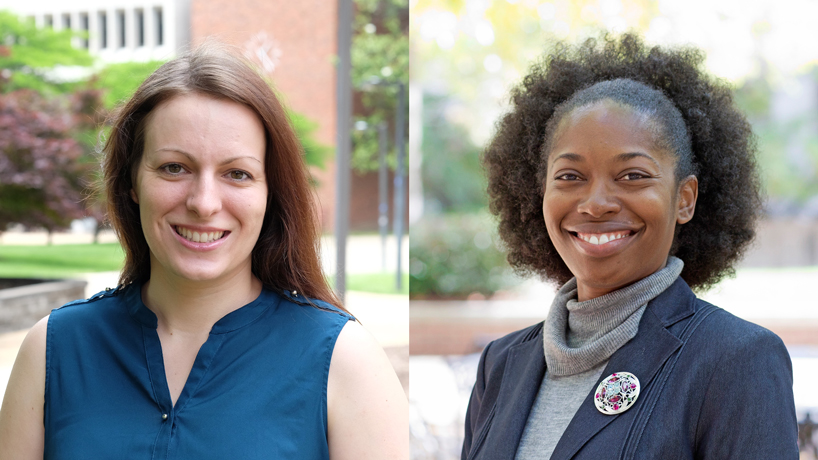
Stephanie Van Stee (left), assistant professor of communication, and Sha-Lai Williams, assistant professor of social work, have received a University of Missouri Research Board Grant to study which health messages will best reach African American college students. (Photos by August Jennewein)
African American college students are among those least likely to seek help for mental health issues, and a pair of researchers from the University of Missouri–St. Louis would like to find out how to change that.
Sha-Lai Williams, assistant professor of social work, and Stephanie Van Stee, assistant professor of communication, have obtained a $45,000 University of Missouri Research Board Grant to study which messages are most likely to encourage African American college students to seek help.
African Americans are about half as likely as the general population to seek support for mental health needs, and college students have utilization rates of 20 percent or less, Williams said. The problems of utilization are compounded when individuals are members of both populations.
“Students with untreated mental illness will be less likely to graduate, secure employment and more likely to be homeless,” Williams said. “It’s a hodgepodge of risk for this particular population.”
Van Stee and Williams will present health messages to 40 African American college students to see which messages students respond to the most. Participants will randomly look at two health messages that differ in some way. A person might get one message that’s literal and one that’s metaphorical, or one that’s targeted to a specific group and one that’s designed for the general population. Participants will then undergo interviews to determine their response to the messages.
The research team hopes this year’s study will be the first phase in a multi-year project that will be expanded to a broader population of students, and will result in higher utilization rates for mental health services, and fewer barriers to academic success.
“I think this issue is important for student success,” Van Stee said. “I see a direct relationship between what we’re studying and helping students succeed at UMSL.”
College students might not seek care because they might be unaware that their health plans cover mental health services and that services are available on campus, Williams said. In addition, many fear they will be stigmatized if they seek mental health care, particularly in the African American community.
The population Williams and Van Stee are targeting is also highly likely to use informal sources of support, such as friends, peer counselors or religious leaders. Approaching a familiar face can be a good way to reach out for help initially, but more formal treatment is often needed to overcome mental illnesses, Williams said.
“It is beneficial if those individuals can say ‘I’m glad you came to talk to me, but it sounds like this might be something outside my scope of expertise,’” Williams said.
Media Coverage:
Columbia Daily Tribune














